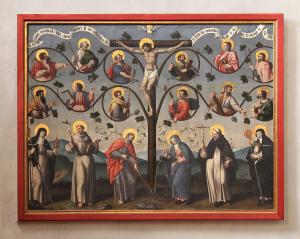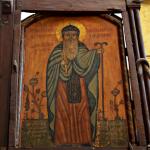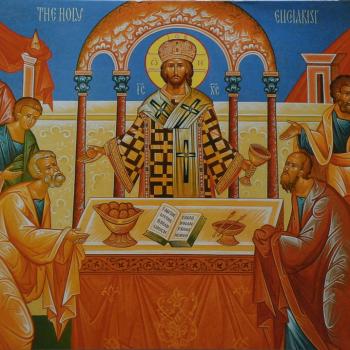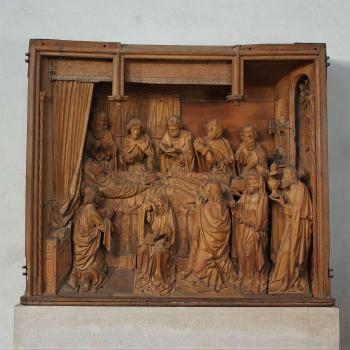
Jesus is the Logos made flesh. As the Logos, all things come from, or were made through, him. Now, as the incarnate Logos, all things remade by him. They find themselves not only restored to their own proper logos, the original identity, they find themselves made new, made different, capable of being something greater than they were before. We are assured that what the restoration brought about by is not only for our spiritual side, but for our whole being.
God has taken interest in the whole of creation, working in and with the world, in and with history, making sure that the grace which is offered by the incarnate God-man is offered to the whole of creation. History is important, and that means, the pre-history of the incarnation is also important and must not be forgotten. We should not ignore the lessons of that history. Many of us are from Gentile nations, not connected to the Covenant of Moses. But thanks to the incarnation, we now have become fellow sojourners with the people of Israel. “So then you are no longer strangers and sojourners, but you are fellow citizens with the saints and members of the household of God, built upon the foundation of the apostles and prophets, Christ Jesus himself being the cornerstone, in whom the whole structure is joined together and grows into a holy temple in the Lord; in whom you also are built into it for a dwelling place of God in the Spirit” (Eph. 2:19-22 RSV). The spiritual death which sin brought to the world does not reign supreme; the Logos made flesh, Jesus, came to all, including and especially those the power of sin and death seemed to control, showing that there remained in them all some spiritual life, some good, which Jesus could and would use to restore them, something Jesus demonstrated by analogy through the way he raised the daughter of Jairus back to life (cf. Lk. 8:41-56). All those whom people have said cannot be saved, are shown by Jesus to be those whom he came to receive and bring back to life, helping them to become children of God with everyone else.
Sadly, many Christians, many Gentile converts, have become way too prideful in their new status. They look down upon others, upon those who have not yet embraced Jesus, becoming disdainful of them, and in the process, ignoring and forgetting the kind of charitable character Jesus wants his followers to have. They might have received grace, but through their pride, they strangle it, threatening to cut themselves off from it. Paul saw this happening in his lifetime. Many converts to the faith were former Gentiles who had little to no connection to the people of Israel and God’s covenant with Moses. While God was active in and with all humanity in a variety of ways, God’s engagement with the people of Israel was special, and it is was in and through that engagement, the incarnation took place. The people of Israel held a special role in salvation history, and so has a special place within the whole of humanity. They became the cornerstone by which God brought humanity together. Paul wanted the former Gentiles to remember this, to remember where they came from, to remember they were once not so connected to the people of Israel and their historical mission. Christ brought them in; he united them with the history of the people of Israel. It becomes a part of their history, but only because they are grafted into it. They should, therefore, show respect to the people of Israel, knowing that they were once alienated from them, and now, because of Christ, they did not have to be:
Therefore remember that at one time you Gentiles in the flesh, called the uncircumcision by what is called the circumcision, which is made in the flesh by hands — remember that you were at that time separated from Christ, alienated from the commonwealth of Israel, and strangers to the covenants of promise, having no hope and without God in the world. But now in Christ Jesus you who once were far off have been brought near in the blood of Christ (Eph. 4:11-13 RSV).
The messianic mission and legacy is one which is not only associated with Christ, but is a legacy which belongs to the people of Israel, to the Jews. Their history, their engagement with God, was a part of that mission, and indeed, served as a precondition for it. They are, in that respect, co-workers with Christ, for all they accomplished, all the grace that was brought into the world, itself was taken in by Christ and served as the foundation for his own messianic work (and in this fashion, one can better understand the role, and titles, given to the Virgin Mary, as all those graces coalesced and were made one in her so that they could be shared and given over to Christ, her son). Jesus is the link who brings everyone together. Christ came to heal the divisions within humanity, to make humanity one. But his work is not just with humanity. He brings together the whole of creation, showing it its integral unity. Jew and Gentile, man and woman, humanity and the rest of the cosmos, all are able to be made one in him. “For he is our peace, who has made us both one, and has broken down the dividing wall of hostility” (Eph 2:14 RS).
Jesus reconciles all things through his self-sacrificial love. All the discord in creation, established in and through sin, through unlove, is met by his greater love, the love which is revealed not only in his preaching, not only in the way he healed many who came before him, but in the way he was willing to lay down his life for us all. At the cross, all the pain and hostility of sin is brought down upon Jesus, and through it, the heart God has for humanity, indeed, for the whole of creation is exposed. We see love in action, a love which shows us the way of sin is a dead-end. Thus, he accepts all that we should do to him so that he “…might reconcile us both to God in one body through the cross, thereby bringing the hostility to an end” (Eph. 2:16 RSV).
Jesus preached love and peace, but he is also the means by which they are brought back to creation. He uses them to help us come to God and become children of God. “And he came and preached peace to you who were far off and peace to those who were near; for through him we both have access in one Spirit to the Father” (Eph. 2:17-18 RSV). We are called to be children of God, but as long as we are caught up in hate, and engage the division and discord which hate brings, we can never experience the glory which God created us to have. Paul wanted the Gentile converts to understand this. They should not look to the Jews with hate. They should not look to anyone with hate. So long as they do so, they risk being cut off from Christ themselves. They should truly take on Christ, and in doing so, continue the work of Christ, embracing love and using it to foster more and more peace in the world. And we, so many centuries later, can see how important Paul’s words are. Christians, sadly, have not heeded them. As a result, though grace comes to the world in and through us, in and through the church, we have done much to hinder it and in that way, cause a great scandal, one which has led many others to wonder about the value of the Christian faith and what it was Jesus truly accomplished.
Stay in touch! Like A Little Bit of Nothing on Facebook.
If you liked what you read, please consider sharing it with your friends and family!

















